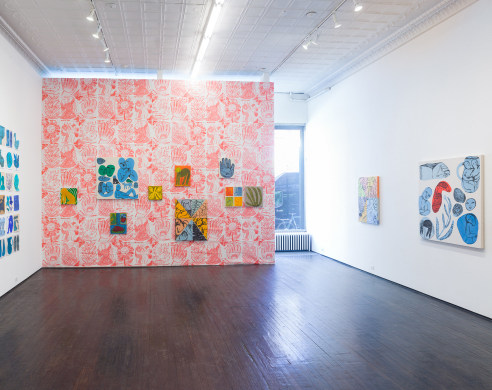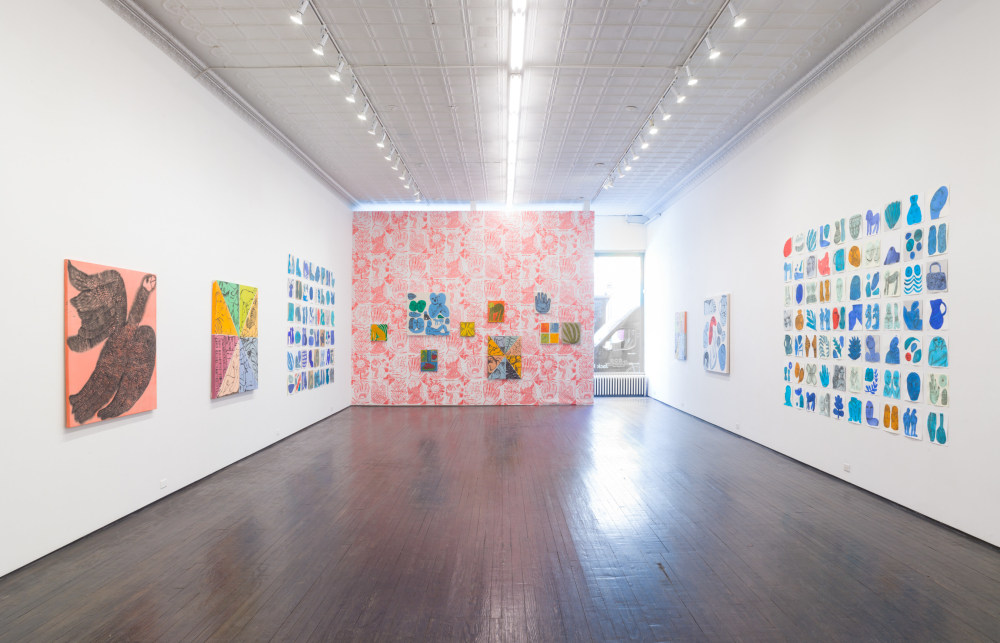
Emma Kohlmann Reviewed in Arte Fuse
Michael Busch on Kohlmann's Solo-Exhibition
May 1, 2018

Like dreams, Emma Kohlmann’s paintings inhabit a surreality shaped by the forms and feelings of waking life. In a new exhibit of her work, currently on view at Jack Hanley Gallery, she presents us with strange animals and gelatinous people, anthropomorphic pottery, totems, and the random fetish. The mythological symbolism and sexual impulses animating the world summoned by Kohlmann are by turns familiar and uncomfortable. The art itself is uncompromising and powerful.
Kohlmann’s phantasms would be unsettling if not for her playful use of color and representation, as well as the tenderness with which she treats her subjects. This is most strikingly evident in a pair of pieces on opposite walls, “Interior Blue Series, 2018” and “Variations on Cerulean, Phthalo, and Ice Blue, 2018,” respectfully. Both compromise beautifully arranged, tiny watercolors in rich hues of yellow, orange and blue, each one depicting simply–and sometimes grotesquely–drawn animals, objects, plants, and people.
Despite the crude renderings of form that characterizes her work, Kohlmann demonstrates great skill and confidence in execution. In “Swan Dive,” for example, an ungainly dark bird appears to soar upwards into the sky with feathers rendered so perfectly hazy that they suggest at once texture and motion. “In the Pines,” depicting an impossibly blue dog resting near an unfurling green plant recalls the energy and elegance of a Matisse cutout. Even in her more slapdash moments, it’s clear that Kohlmann knows what she’s doing.
But it’s the people in Kohlmann’s paintings that exhibit the real strength and psychological depth of her approach. They’re fleshy and unapologetically erotic, sometimes masturbating alone or clutching a partner in bed. This isn’t pornography for an outsider’s gaze, however. Sex, here, seems to remind us of a more basic duty: to preserve ourselves and care for others in a world of uncertainty and alienation. While Kohlmann clearly draws out a subconscious plane of activity in her work, she’s also interested in the mechanics of the conscious mind.
Wallpapering the north and south walls of the gallery are wild prints in red and white, labeled with the sort of mundane thoughts and half-baked slogans that preoccupy the imagination and order our philosophical inclinations. “There is too much emphasis on being seen,” says one. “Be kind and thoughtful,” commands another. The print doubling as the exhibit’s poster states simply, “I am searching for something but I don’t know what it is.”
Kohlmann populates this backdrop with scenes of moving intimacy. Her misshapen people caress and regard one another. They kiss lightly, hold hands and rest their head on a partner’s shoulder. Solitary figures curl up, stretch out, languidly pleasure themselves, or rest. Solitary figures curl up, stretch out, languidly pleasure themselves, or rest. To the extent that gender factors in these connections–Kohlmann frequently blurs the categories or erases them altogether–it takes a backseat to a more primal need for physical communion, a ministry of touch.
Necessary, to be sure. But Kohlmann is no sentimentalist. Her portraits of episodic intimacy all take place in suffocating conditions of extreme confinement. In “Red Couple,” two bodies press up against each edge of the canvas like they’re struggling to sleep on a mattress that’s too small. “Primal Hand Mano, 2018” features a hand with people squeezed into each finger, and one uncomfortably arranged along the palm. Bodies are similarly cramped into other shapes and colors throughout the gallery, including petals on a flower and the wings of a butterfly.
This heightened sense of discomfort shares a frequency with fever dreams threatening to spill over into the realm of nightmares. Kohlmann always pulls back, though, offering flashes of the weird and wonderful for contemplation, not just momentary response. If the show begins to take on the weight of a reverie, it’s extinguished immediately upon exiting the gallery. Like waking suddenly from a dream that hasn’t fully run its course, you’ll wonder what just happened. And Kohlmann’s images will linger for the rest of the day.
“Emma Kohlmann” continues at Jack Hanley Gallery (327 Broome Street, Lower East Side, Manhattan) through May 20.